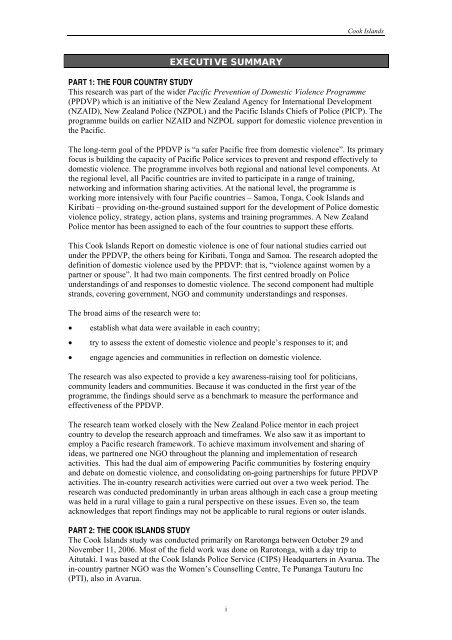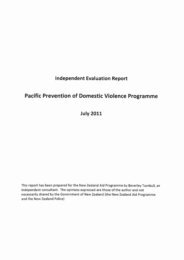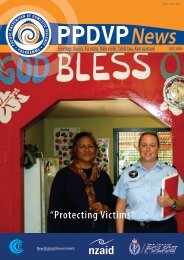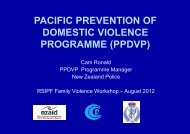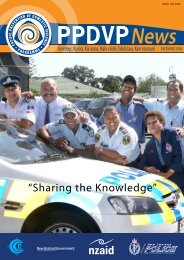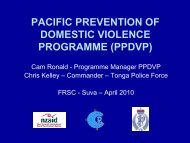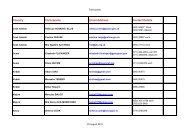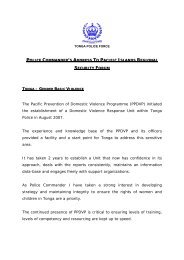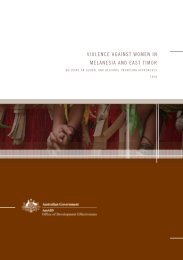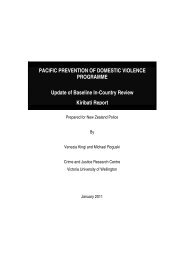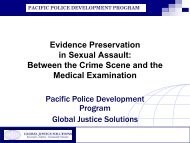Cook Islands - Pacific Prevention of Domestic Violence Programme
Cook Islands - Pacific Prevention of Domestic Violence Programme
Cook Islands - Pacific Prevention of Domestic Violence Programme
Create successful ePaper yourself
Turn your PDF publications into a flip-book with our unique Google optimized e-Paper software.
<strong>Cook</strong> <strong>Islands</strong><br />
EXECUTIVE SUMMARY<br />
PART 1: THE FOUR COUNTRY STUDY<br />
This research was part <strong>of</strong> the wider <strong>Pacific</strong> <strong>Prevention</strong> <strong>of</strong> <strong>Domestic</strong> <strong>Violence</strong> <strong>Programme</strong><br />
(PPDVP) which is an initiative <strong>of</strong> the New Zealand Agency for International Development<br />
(NZAID), New Zealand Police (NZPOL) and the <strong>Pacific</strong> <strong>Islands</strong> Chiefs <strong>of</strong> Police (PICP). The<br />
programme builds on earlier NZAID and NZPOL support for domestic violence prevention in<br />
the <strong>Pacific</strong>.<br />
The long-term goal <strong>of</strong> the PPDVP is “a safer <strong>Pacific</strong> free from domestic violence”. Its primary<br />
focus is building the capacity <strong>of</strong> <strong>Pacific</strong> Police services to prevent and respond effectively to<br />
domestic violence. The programme involves both regional and national level components. At<br />
the regional level, all <strong>Pacific</strong> countries are invited to participate in a range <strong>of</strong> training,<br />
networking and information sharing activities. At the national level, the programme is<br />
working more intensively with four <strong>Pacific</strong> countries – Samoa, Tonga, <strong>Cook</strong> <strong>Islands</strong> and<br />
Kiribati – providing on-the-ground sustained support for the development <strong>of</strong> Police domestic<br />
violence policy, strategy, action plans, systems and training programmes. A New Zealand<br />
Police mentor has been assigned to each <strong>of</strong> the four countries to support these efforts.<br />
This <strong>Cook</strong> <strong>Islands</strong> Report on domestic violence is one <strong>of</strong> four national studies carried out<br />
under the PPDVP, the others being for Kiribati, Tonga and Samoa. The research adopted the<br />
definition <strong>of</strong> domestic violence used by the PPDVP: that is, “violence against women by a<br />
partner or spouse”. It had two main components. The first centred broadly on Police<br />
understandings <strong>of</strong> and responses to domestic violence. The second component had multiple<br />
strands, covering government, NGO and community understandings and responses.<br />
The broad aims <strong>of</strong> the research were to:<br />
• establish what data were available in each country;<br />
• try to assess the extent <strong>of</strong> domestic violence and people’s responses to it; and<br />
• engage agencies and communities in reflection on domestic violence.<br />
The research was also expected to provide a key awareness-raising tool for politicians,<br />
community leaders and communities. Because it was conducted in the first year <strong>of</strong> the<br />
programme, the findings should serve as a benchmark to measure the performance and<br />
effectiveness <strong>of</strong> the PPDVP.<br />
The research team worked closely with the New Zealand Police mentor in each project<br />
country to develop the research approach and timeframes. We also saw it as important to<br />
employ a <strong>Pacific</strong> research framework. To achieve maximum involvement and sharing <strong>of</strong><br />
ideas, we partnered one NGO throughout the planning and implementation <strong>of</strong> research<br />
activities. This had the dual aim <strong>of</strong> empowering <strong>Pacific</strong> communities by fostering enquiry<br />
and debate on domestic violence, and consolidating on-going partnerships for future PPDVP<br />
activities. The in-country research activities were carried out over a two week period. The<br />
research was conducted predominantly in urban areas although in each case a group meeting<br />
was held in a rural village to gain a rural perspective on these issues. Even so, the team<br />
acknowledges that report findings may not be applicable to rural regions or outer islands.<br />
PART 2: THE COOK ISLANDS STUDY<br />
The <strong>Cook</strong> <strong>Islands</strong> study was conducted primarily on Rarotonga between October 29 and<br />
November 11, 2006. Most <strong>of</strong> the field work was done on Rarotonga, with a day trip to<br />
Aitutaki. I was based at the <strong>Cook</strong> <strong>Islands</strong> Police Service (CIPS) Headquarters in Avarua. The<br />
in-country partner NGO was the Women’s Counselling Centre, Te Punanga Tauturu Inc<br />
(PTI), also in Avarua.<br />
i


